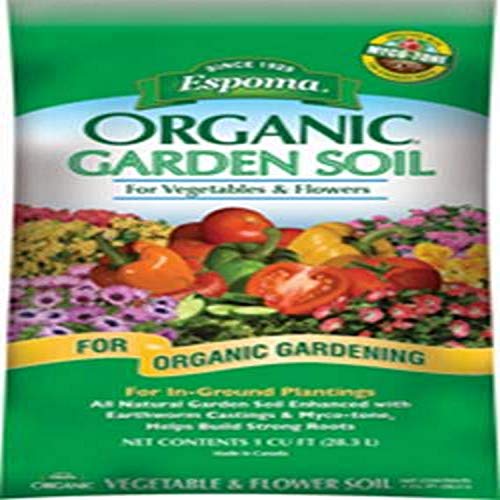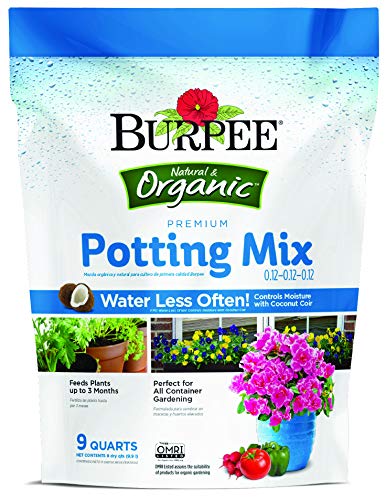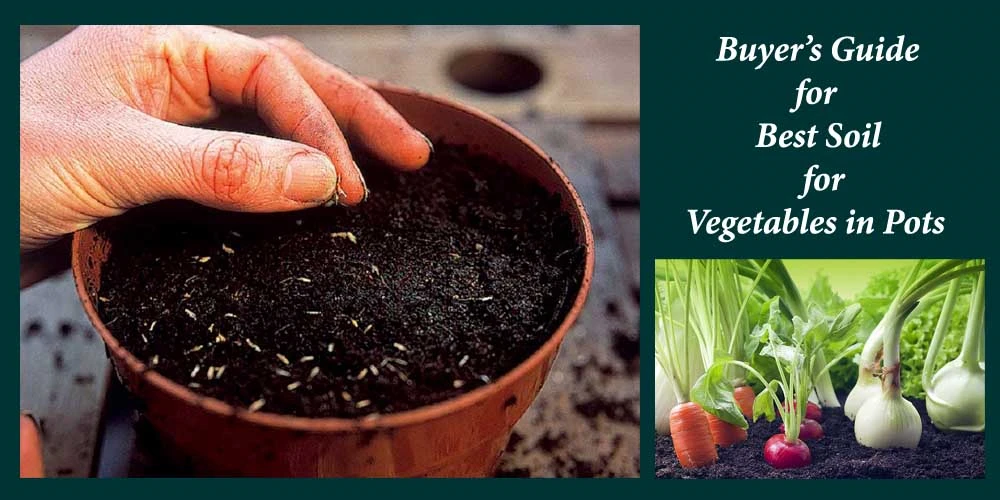reviewed by Truman Perkins
Do you recall those times when you wanted to cultivate a lovely vegetable garden in your house but couldn't get it to work? The best soil for vegetables in pots might be at blame, causing the plant to develop an unhealthy root system.
The best soil for vegetables in pots, often known as potting compost or potting mix, is dirt used to grow plants. It's a medium for growing vegetables, plants, and herbs in a container or pot. The soil is in great demand throughout the year since people can cultivate their herbs indoors all year. This article will show you the best organic soil for vegetables or planting vegetables on the market right now.
Contents


The soil is light, compact, easy to carry, and with a resealable bag, it saves space. The best soil for vegetables in pots is easy to use. Ultimate compressed soil granules can quickly expand up to 4X and make up to 3 gallons of soil. The Package is filled with potential nutrients plus trace minerals, concentrated super soil that feeds your plants for months. The process makes them grow up to 3X bigger!
Soil stays moist 3X longer and gets water, air, and nutrients to roots continuously on demand-the perfect solution for all plants, containers, and gardens. Organic mixture with 100% natural ground coconut coir, worm castings, mycorrhizae, beneficial bacteria, amino acids, humic acids, and kelp give your soil, plants, and garden a super-boost.
The garden soil is Kid, pet & planet friendly soil, conditioner and supplement grow more colorful flowers and better-tasting nutritious vegetables that are far healthier for you.


This well-reputed and recognized family-owned brand are famous for soil mix bag on the global market. The best soil for vegetables in pots is designed for container planting. Whether you're growing a cactus in the living room, a geranium on the patio, or a lemon tree on the deck, use this soil in your containers.
This is nutrient-rich is highly recommended for container gardens which are ready to use right out of the bag. Its pH is adjusted to allow for maximum nutrient uptake. The benefits of the soil enrich the plant structure, vigorous vegetative growth, with enhanced fruit and flower production.


Coast of Marine OMRI is an IDEAL Mix for your garden. The soil is lightweight, organic compost soil blend that's perfect for your tomatoes and vegetables. A package contains a total of 20 quarts of gardening soil for your container garden or professional farm.
The soil is NUTRIENT DENSE with a Dark brown blend of composts and nutrients to provide everything your plants need. The best organic soil for vegetables or your fruit is ORGANIC OMRI-listed and preservative-free for use in organic gardening operations. The balanced design encourages water retention and continuous drainage.


Best organic soil for vegetables is an all-natural blend of nutrient-boosting ingredients that help enhance soil conditions for growing in containers. The best soil for vegetables in pots suitable for indoor and outdoor use is its moisture management - making it ideal for use with potted fruit & vegetable plants, trees for the home, or annual bloomers kept on the patio. It has moisture retention and water absorption quality with three main soil components; Perfect Plants Perlite, Coconut Coir, and Peat Moss. The early and professional growers at that manage moisture and sufficiently enrich the soil conditions of containerized plants.
Comes in a resealable 8-quart bag for easy storage and future use. Mycorrhizae, Worm Castings, and Composted Pine are some nutrient-boosting elements in our formula. These balance the pH of your gardening soil. The highest-quality mix for indoor and outdoor plants allows them to blossom and fruit for more extended periods while also enhancing plant longevity.


For rapid root development, use this best soil for vegetables in pots or gardening mix. The organic mix soil thoroughly mixes with blonde sphagnum peat with frost gold and a small amount of organic fertilizer. This is the best choice for maximum general organic indoor potting development, organic ornamentals seedlings, and cuttings in trays and paper plugs. This organic soil mixes for your garden with balanced pH (5.5), and it is lightweight. The mixing is specially formulated for fast root development and helps build strong roots for healthy, vigorous plants. Soil mix is excellent for germinating most seedlings of organic vegetables, herbs, flowers, indoor ornamentals, fruits, succulents, cactus, and so on. It is a 100% organic and all-natural seedling mix.
This best potting soil for vegetables comes in a small bag which is excellent for early gardeners. It is also effective for indoor home planting and lovers of home gardening. Soil is packed in a reusable sealing bag to keep the soil fresh. It is easy to open and remain usable with moisture contents for long terms.


Espoma gardening soil comes up with all-natural & organic nutrients that keep your plants safe and healthy. It's a Premium Quality Blend enhanced with Myco-tone®. A blend of 11 strains of endo and ectomycorrhizae. This formula will help you to determine how much water you need to use when watering the plants - not too much, not too little.
The potting soil shows that everything inside is organic, and it guarantees that your plants will get at least 2% potash, 7% nitrogen, and 2% phosphate. The product is the best soil for vegetables in pots that contain sphagnum peat moss, peat humus, and earthworm castings to help loosen heavy soil.


Experienced agronomists and biologists develop the product. Mother Earth Terracraft All Purpose Gardening Soil is another highly rated and popular soil for cultivators. It is to consider at a very reasonable price! Featuring an abundance of healthy ingredients, this all-in-one offers can help to nourish your garden plants from seed to harvest!
It creates the perfect conditions for your plants, whether you're growing indoors or outdoors. Aeration is moderate, and the NPK is 0.19-0.08-0.11. The best soil for vegetables in pots, including flowers, tomatoes, and vegetables. The soil mix has moderate aeration provides moisture retention. You can start feeding the soil mix 2 or 3 weeks after planting. The combination creates a desirable environment for all types of plants. Suitable for many growing environments, including indoor, outdoor, containerized, or raised beds.


A Natural, sustainable soil mix for your garden. Organic nutrients made from coconut fiber, coir pith particles are virtual particles of the compound. The combination is pH balanced, low in natural salts, no weeds that provide better aeration than soil.
The best soil for vegetables in pots has sponge-like properties of coconut fiber will absorb up to 10 times its weight in water. Soil mix fibers are unique microscopic tubes that fill then allow excess water to pass through. This creates air space, providing vital oxygen to plant roots. Increased oxygen and excellent drainage mean fewer over-watering problems, the #1 reason for plant failure.
The pile coconut is compressed, making it easy to carry, handle and store. All you have to do is soak the coco coir brick in water for at least 1 hour before using it. A fully hydrated brick can hold eight to ten times its volume in water. The final volume of the expanded coir depends on the amount of water used to constitute it.
Environmentally friendly pith is fine husk fibers from coconuts. The mix is easily useable in greenhouses, landscaping, garden beds, individual pots, terrariums, grow bags, vertical gardens, or container gardens on the patio. These compressed coco fiber blocks are a perfect growing medium and can start seeds or roots in a pot or planter.


A kind of best soil for growing vegetables that includes earthworm castings, bat guano, and sea-going fish and crab meal. Interestingly, it could be ready to use in its bag. 38.6 quarts of the bag contain FoxFarm Ocean Forest Gardening Soil. The best solution for your hungry garden plant. I bought this potting soil to use in pots, boost my seedlings' health, and enjoy the result. It took only two weeks to see the further growth it could help my plants, compared to some other potting soil that I used to buy.
The ultimate gardening soil that has everything your plants need in one bag. It has the perfect blend of earthworm castings, bat guano, sea-going fish & crab meal, forest humus, moss & more. The ocean forest has balanced pH of 6.3 to 6.8 to allow for optimum fertilizer uptake. It encourages strong branching and a sturdy, healthy growth habit and is ideal for containerized plantings.


Black Gold, the all-purpose organic gardening soil that fits all your needs; convenience, quality tested organic ingredients and a proven track record of performance. Soil mix offers premium quality at outstanding savings. The organic materials review institute lists the best soil for vegetables in pots to produce organic food and fiber. It is rich; the loamy mix is one of the best for all gardening applications.
Perlite and pumice are added to ensure optimum pore and air space for sturdy growth. You can use it in hanging baskets, patio containers, herb gardens, vegetable plantings, and anywhere you would like to use organic soil. The product is regionally formulated in the western region only.


Burpee Natural & best soil for planting vegetables in pots mix is enriched with Burpee plant food for vibrant flowers and delicious vegetables and herbs. Perfect for container and raised bed gardening. The growing mix feeds the plants instantly and provides a slow-release plant nutrient that feeds for up to 3 months.
The mix is formulated with coconut coir, an organic and sustainable resource that helps maintain moisture between waterings for vibrant flowers and delicious vegetables and herbs. The product is OMRI listed for organic use.


New Coast of Marine-A best soil for vegetables for raised garden beds, planter boxes, and container gardens. The product is OMRI Listed for Organic Use. It is packed with nutrition with a ready-to-use formula that contains everything your garden bed needs. No additional mixing or recipe needs. The kelp meal and greensand help to replenish micro-nutrients and reduce tilling. Contains Biochar helps to reduce the leaching of soluble nutrients after heavy rain.

It's worth noting because there is a profusion of gardening soil possibilities. However, you should bear in mind that not all solutions will supply your plants with the necessary foundation. You must understand the differences and characteristics of the two main types of potting soil: organic and non-organic.
The majority of individuals choose to grow their plants on organic soil. This is because organic soil does not contain genetically modified herbicides and chemicals. Organic material is more valuable than conventional soil, as the name implies. Natural elements in this soil mix ensure that your plants receive the nutrients they require to thrive.
However, the elements in different organic soil mixtures will vary. Compost, seaweed, soybean meal, humus, mushroom compost, fish meal, bat guano, and bone meal are some of the most popular components.
The precise gardening mix you must use may largely depend on the plant you intend to cultivate. Planting succulents and cacti, for example, will necessitate different potting soil mixtures than planting orchids, as they require other nutrients to thrive. As a result, utilizing suitable organic potting soil will guarantee that your plants develop naturally and have robust root systems.
Non-organic soil, on the other hand, is devoid of organic stuff. You won't discover any of the common elements found in natural soil mixtures, either. This soil is made up of bark, peat moss, and perlite/vermiculite and is commonly referred to as "normal soil mix."
You will find non-organic potting soil that includes Styrofoam in the mix to hold more water and create more air space from time to time. However, these mixes are very cheap and not as good for your plants as Styrofoam will come to the surface, and the wind will blow it away, giving the pot or container an unappealing look.

Non-organic soil, on the other hand, is devoid of natural stuff. You won't discover any of the common elements found in natural soil mixtures, either. This soil is made up of bark, peat moss, and perlite/vermiculite and is commonly referred to as "normal soil mix." Most non-organic potting mixes contain these components.
Some commercial brands of gardening soil include fertilizer into their soil. This is a benefit as fertilizers help the plants grow; however, it's tough to distinguish how much fertilizer you will give to a plant at a time.
The success of the best soil for vegetables in pots for your plants is entirely dependent on you. You have to water it regularly. Plants will stretch their root systems outward and downward in quest of water if they live in a location where it doesn't rain frequently. Many high-quality mixtures incorporate a moisture-controlling ingredient. The Horticultural vermiculite, for example, will hold additional water.
There are two primary affinities between potting soils, as previously stated. Organic potting mixes are often heavier and more costly than non-organic potting mixes. Furthermore, organic soil is formed from organic materials instead of the other alternative, manufactured from synthetic materials. Last but not least, non-organic blends are renowned for losing nutritious value over time, but organic mixes do not.
It's essential to understand the difference between these two potting soil options. However, it's only the first step. To further help you with that, you have to consider a few essential things before buying a specific type of potting soil.
Because plants require moisture and essential nutrients to flourish, the best soil for growing vegetables you choose should be able to retain both. Check to see if the soil you're buying has this capacity before you buy it, whether it's organic or non-organic. You may find out by looking at the product description and reading the list of components in the mix. For example, in non-organic soil, peat moss will help retain nutrients and moisture, meaning that the more peat moss, the better the moisture and nutrient retention will be.
Apart from the moisture and nutrients, your plants need good air circulation. Your potential gardening soil should guarantee this. Fluffy and light mixes are perfect for this as they will provide maximum airflow. The best soil for planting vegetables in pots you get also shouldn't get too dense when it's wet as this will prevent developing mold and smothering the plant.
The soil density is critical, and you should be sure that it will be effective for your plants before you buy the soil mix. You can test this by poking it with your fingers, and if it has some flexibility, it's okay.
Also, your gardening soil isn't supposed to become challenging when you add water. This will cause the plants to grow their roots very hard through the soil. One more way to test the soil density is to lift the bag before you open it. If the bag is hefty, the potting soil is probably full of fillers, such as sand or mulch, and most plants will find this kind of soil unsuitable for the best growth.
Never buy potting soil before you take a look at the list of ingredients to find out what's inside the bag. Good potting soil shouldn't contain only one nutrient because your plants won't benefit from it. The more nutrients a potting soil contains, the better your plants will use it and will grow healthier.
Before everything, we recommend not using the soil from your garden or yard, as it can contain fungal diseases, weed seeds, and insects. Buy the best ground for vegetables in pots, and you'll be much better off.
When it comes to watering the soil, you can probably water it once a week if the weather is mild in the spring. However, plants are going to need more water as the summer continues. The warm weather will evaporate the moisture before the plant can even use it, and your plants will require more water over time because they'll get more prominent-constantly water the soil, not the flowers and leaves. If you wet the foliage, you are creating the possibility for your plant to get a fungal disease or scorched leaf spots.
Plants that grow in the ground need much less fertilizing than those growing in containers. The more you water the soil, the faster you will flush the nutrients out of it. If you would like to have the happiest and healthiest plants possible, you should feed them with a soluble fertilizer every few weeks, according to the directions on the package.
Are you new to gardening? Then you should know a few things before putting your plants into containers.
If you plan to use a vast container for your plant, place it somewhere where it will live. If you don't do this, you will be forced to move that content to another place, and that's not going to be an excellent day for your back. It can be overwhelmingly heavy and might even require a team of people to move the container.
Always attempt to utilize containers with drainage holes. The more holes you have, the better. If you don't have any of these containers, you can always drill some holes in them to get the same effect. You will avoid overwatering your plants this way. Keep in mind that you must check your plants' moisture requirements.
You can check if you need to water the soil by putting your finger into it up to your second knuckle. Water your plant if the soil feels dry at your fingertip. Overwatering the plant might cause its leaves to fall off or turn them yellow. If the soil is very wet, consider moving your container to a breezy, dry spot until it becomes less saturated.
Under-watered plants have identical difficulties as those that are over-watered. In the summer, you'll need to water the plants at least once a day. Because tiny pots store less soil, you might consider watering the soil even more frequently. When watering, make sure the soil is well saturated. Only a few droplets of water will permeate the soil if you only give it a few drips.
FoxFarm Ocean Forest Potting Soil Mix Indoor Outdoor for Garden and Plants | Plant - Walmart Link
Compressed Organic Potting-Soil for Garden & Plants - Expands up to 4 Times When Mixed - Walmart Link
Organic Potting Mix by Perfect Plants for All Plant Types - 8qts for Indoor and Outdoor - Walmart Link
FoxFarm Ocean Forest & Happy Frog Garden Potting Soil Mix for Indoor and Outdoor Plants - Walmart Link
Coast of Maine OMRI Listed Tomato and Vegetable Plant Potting Soil Compost Blend for - Walmart Link
Miracle-Gro Expand 'n Gro Concentrated Planting Mix 0.33 Cu Ft - Walmart Link
Miracle-Gro Water Soluble Plant Food Vegetables & Herbs 2 lb - Walmart Link
FoxFarm Ocean Forest Potting Soil Mix Indoor Outdoor for Garden and Plants | Plant - eBay Link
Compressed Organic Potting-Soil for Garden & Plants - Expands up to 4 Times When Mixed - eBay Link
Organic Potting Mix by Perfect Plants for All Plant Types - 8qts for Indoor and Outdoor - eBay Link
FoxFarm Ocean Forest & Happy Frog Garden Potting Soil Mix for Indoor and Outdoor Plants - eBay Link
Coast of Maine OMRI Listed Tomato and Vegetable Plant Potting Soil Compost Blend for - eBay Link
Miracle-Gro Expand 'n Gro Concentrated Planting Mix 0.33 Cu Ft - eBay Link
Miracle-Gro Water Soluble Plant Food Vegetables & Herbs 2 lb - eBay Link
Based on the product descriptions above, you can determine the best soil for vegetables in pots for your garden now. The type products are mentioned provide a perfect quality base for almost all plants and are very easy to use. On top of this, select the products with great water retention, quality nutrients, organic materials, and good user reports.
Have you made your choice?
Happy gardening!
 |
 |
 |
 |

About Truman Perkins
Truman Perkins is a Detroit-based SEO consultant who's been in the business for over a decade. He got his start helping friends and clients get their websites off the ground, and he continues to do so today. In his free time, Truman enjoys learning and writing about gardening - something he believes is a natural stress reliever. He lives with his wife, Jenny, and their twins in Detroit.
 |
 |
 |
 |